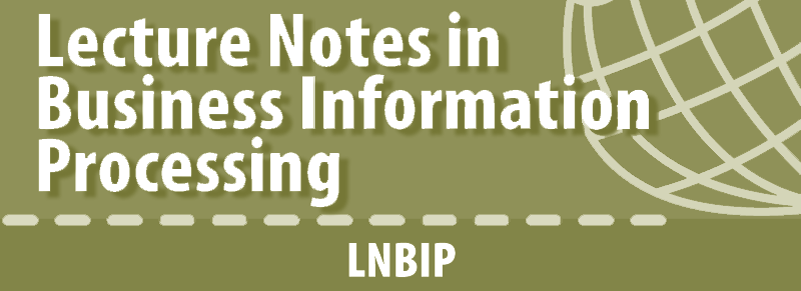1st International Workshop on Hybrid Artificial Intelligence and Enterprise Modelling for Intelligent Information Systems (in conjunction with CAiSE 2023)
Hybrid Artificial Intelligence is the research direction that focuses on the combination of two prominent fields sub-symbolic AI (e.g., machine learning, deep learning, neural networks) and symbolic AI (e.g., knowledge graphs, knowledge representation and reasoning, knowledge engineering, knowledge-based systems). Approaches from both fields have complementary strengths and enable the creation of Intelligent Information Systems (IIS). For example, whilst neural networks can recognize patterns in large amount of data, knowledge-based systems contain domain knowledge and enable logical reasoning and explainability of conclusions. AI approaches are typically integrated with application systems, which provide data for the AI approaches and use the results of these approaches for further processing. Thus, the creation of IIS requires high expertise in both AI approaches, knowledge about the application domain and IT knowledge. An early inclusion of domain experts in the engineering process is beneficial as it promotes a high quality of an IIS and would reduce its building time. Such an early inclusion is, however, challenging because stakeholders from business and IT have complementary skills and speak different languages: one more technical and one more business oriented. Enterprise Modelling (EM) can tackle this challenge as it supports business and IT alignment. It is an established approach for the conceptual representation, design, implementation, and analysis of information systems. This is of relevance for AI approaches. Graphical notation of enterprise models fosters human interpretability, hence supporting communication and decision-making, involving stakeholders from the application domain, IT and AI. The convergence of Hybrid Artificial Intelligence and Enterprise Modelling promises to deliver high value in the creation of Intelligent Information Systems.
Objective and Topics
This workshop aims to bring together researchers and practitioners from Machine Learning, Knowledge Representation and Reasoning (incl. Semantic Technologies), and Enterprise Modelling to reflect on how combining the three fields can contribute to engineering intelligent information systems.
Potential topics include (but not limited to):
- Neuro-Symbolic Artificial Intelligence and Enterprise or Visual Models
- Hybrid Artificial Intelligence and Enterprise or Visual Models for Human-in-the-Loop
- Hybrid Artificial Intelligence in and for Enterprise Architecture
- Hybrid Artificial Intelligence for Business Process Management
- Hybrid AI and Visual Models for Ontology Learning
- Hybrid Recommender Systems with Visual Models
- Machine Learning, Deep Learning, Neural Networks, and Visual Models for Human-in-the-Loop
- Machine Learning for Knowledge Graphs or Ontology-based Models
- Machine Learning in Ontology-based Case-Based Reasoning
- Explainable AI through Enterprise Models
- Low code approaches for, e.g., Knowledge Graphs, Machine Learning, Knowledge Engineering, Hybrid AI Engineering
- Visual Conceptual Models for, e.g., Ontology Constraints, Knowledge Graph Embeddings, Machine Learning, Knowledge Engineering
- Domain-Specific Models for Domain Ontology or for Enterprise Ontology
- Knowledge Engineering, Representation and Reasoning and Visual Conceptual Models
- Ontologies and Visual Models for Rule-Based or Case-Based Reasoning approaches
- Semantic Technologies for actionable Enterprise Models
- Combining Ontology-based Business Processes and Data-Driven Approaches
- Enterprise AI
Organisation
In this workshop, we welcome full research papers (12 pages) and short (position) papers (6 pages). The accepted papers will be presented in time slots of 20 minutes for regular papers and 15 minutes for short papers. The quality of this workshop will be ensured by having each contribution reviewed by at least three experts in the field.

The papers will be published in proceedings in Springer LNBIP series and, thus, will be indexed.
WorldCafé style with Real-World Challenges
The setup is such that an ample part of the workshop is dedicated to discussions to identify the need for further applied research. The discussion will be moderated and facilitated by the co-chairs in a WorldCafé style, where groups will be formed to brainstorm the resolution of real-world challenges across industries.
Important Dates
Paper submission deadline: 7 March 2023 Deadline extended: 19 March 2023Authors notification: 4 April 2023Camera-ready: 20 April 2023Workshop date: 12 June 2023
Submissions
To submit your paper you must use the EasyChair site of the CAiSE 2023 conference through the track “Hybrid Artificial Intelligence and Enterprise Modelling for Intelligent Information Systems (HybridAIMS23)”. Submissions must conform to Springer, LNCS format.
Programme Committee
- Karsten Böhm, University of Applied Sciences Kufstein Tirol, Austria
- Dominik Bork, Vienna University of Technology, Austria
- Simone Braun, University of Applied Sciences Offenburg, Germany
- Robert Andrei Buchmann, University Babeș-Bolyai din Cluj-Napoca, Romania
- Fabrizio Fornari, University of Camerino, Italy
- Aurona Gerber, University of Pretoria, South Africa
- Giancarlo Guizzardi, University of Twente, The Netherlands
- Gregor Heinrich, Creditshelf Solutions GmbH, Germany
- Knut Hinkelmann, FHNW University of Applied Sciences and Arts Northwestern Switzerland
- Bo Hu, Barclays Bank, United Kingdom
- Lutz Maicher, HTWK Leipzig University of Applied Sciences, Germany
- Andreas Martin, FHNW University of Applied Sciences and Arts Northwestern Switzerland
- Heiko Maus, DFKI Deutsche Forschungszentrum für Künstliche Intelligenz GmbH, Germany
- Raghava Mutharaju, IIIT-Delhi, India
- Andrea Polini, University of Camerino, Italy
- Uwe Riss, OST University of Applied Sciences of Eastern Switzerland
- Ben Roelens, Open Universiteit, The Netherlands
- Kurt Sandkuhl, University of Rostock, Germany
- Md Kamruzzaman Sarker, University of Hartford, USA
- Hanlie Smuts, University of Pretoria, South Africa
- Alta van der Merwe, University of Pretoria, South Africa
- Frank van Harmelen, VU University, The Netherlands
Programme Chairs

FHNW University of Applied Sciences and Arts Northwestern Switzerland.

Prof. Dr. Hans Friedrich Witschel
hansfriedrich.witschel@fhnw.ch
FHNW University of Applied Sciences and Arts Northwestern Switzerland.

